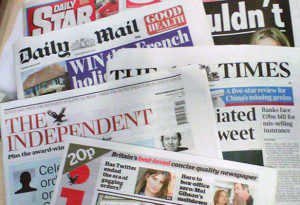 The UK has a press-controlled state rather than a state-controlled press. Phone hacking lawyer Mark Lewis reports on lessons from Leveson
The UK has a press-controlled state rather than a state-controlled press. Phone hacking lawyer Mark Lewis reports on lessons from Leveson
Time and again, the criticism of the Leveson Inquiry is that it is another nail in the coffin of a free press. Who says so? The press themselves. Who are they kidding?
My answer to anyone who raises this argument to me is: “How sweet, you really believe that we have a free press!” Stop and look at the phone hacking scandal. Not the actions of those involved (one scandal), but all those newspapers that did not even report the story (another scandal). Post-Dowler, The Times ran an editorial apologising for not telling its readers. So many papers misled their readership by saying nothing. Absolute censorship. It does not suit us for our readers to know, so we will not tell them. Censorship backed up by the non-regulatory regulator: the Press Complaints Commission. We want it to stay and regulate us, say the press. It isn’t a regulator says the PCC’s new chairman, Lord Hunt. So there you have it, demands by the press for the preservation of non-regulation. A licence to print anything, a licence to ruin lives and, more sinister, a licence to cover up. Which journalist feels able to write an article that accuses his editor? That’s a problem Lord Justice Leveson won’t be addressing.
No matter how strong an advocate one is of freedom of speech, it does not equate with an unrestricted freedom of  the press. It is often lost (although not on LJ Leveson) that “free speech” and a “free press” are not interchangeable concepts. Test the theory: a paedophile wishes to sell pornographic pictures of children. Should he be prevented from doing so? Of course. I doubt anyone would argue seriously that such abuse should be aggravated just because of freedom. I suspect the ubiquitous tabloid reader would (rightly) express moral outrage. Ironically, the same reader who would argue that we should stop that publication would baulk at the idea of any form of censorship.
the press. It is often lost (although not on LJ Leveson) that “free speech” and a “free press” are not interchangeable concepts. Test the theory: a paedophile wishes to sell pornographic pictures of children. Should he be prevented from doing so? Of course. I doubt anyone would argue seriously that such abuse should be aggravated just because of freedom. I suspect the ubiquitous tabloid reader would (rightly) express moral outrage. Ironically, the same reader who would argue that we should stop that publication would baulk at the idea of any form of censorship.
So let’s see where we draw the line. We do need some form of censorship, even John Kampfner, former chief executive of Index on Censorship, would agree. There are times when the balance drops on the side of preventing publication. The press seems to be obsessed with exposing adulterous affairs of footballers and the medical treatment of celebrities, but is not keen at all on any issues regarding journalists. When did you last read of adultery by an editor? Speeding by a journalist? Or drug taking by an opinion writer? Are these the most moral, sober, narcotic-free role models? Or is it that the freedoms they cherish so much include the freedom not to write anything harmful about themselves or their colleagues.
We need to move away from hypocritical attempts to defend scurrilous story-writing by the sanctimonious utterances of those who should know better. The freedoms we want are not freedoms to ruin lives, to gossip or to distract. That is not the free press we strive for: what we want is the freedom to write on any subject about anyone within the confines of good taste. We do not want to have a press that is controlled by a state, but we also do not want to have a press controlled by a quasi-state such as a large corporation.
Leveson has put the ethics of the press in the spotlight. The relationship with the Metropolitan Police has been exposed. People must still ask why a crime was not investigated while the reviewer of that case, John Yates (who described his six-hour review as a “bit crap”), did not re-open a case that subsequently led to Operations Weeting and Elveden. We know from Leveson that the News of the World thought it was entitled to a payback for the glasses of champagne that it had bought for Yates.
The biggest lesson that we have learnt from the inquiry so far is that we have a press-controlled state rather than a state-controlled press. As Rupert Murdoch made clear, he never asked a prime minister for anything. Surely, the response should be: “Exactly, everyone else has to ask.”
Will Leveson deliver? I hope so. The issue is far more wide-reaching than the alleged criminal activities of a few, or even the ability to determine a complaints mechanism that avoids the “chilling effect” of disproportionately expensive legal cases — it concerns democracy itself. We need politicians who are able to represent the people even if our interests are opposed to those of the press; we need police who act against the press without fear of reprisals, and we need journalists who are prepared to tell us what their bosses don’t want us to read.
Mark Lewis is a partner at Taylor Hampton. He represents many clients whose privacy was invaded by the News of the World. He also acted for Dr Peter Wilmshurst and the Sheffield Wednesday fans who were sued for libel
Exclusive extracts from our magazine:
The Blogger | Guido Fawkes | Where will this all end?
The Journalist | Trevor Kavanagh | The Leveson effect
The Editor | Alan Rusbridger | Striking a balance
Hacked Off | Martin Moore | The danger of power




